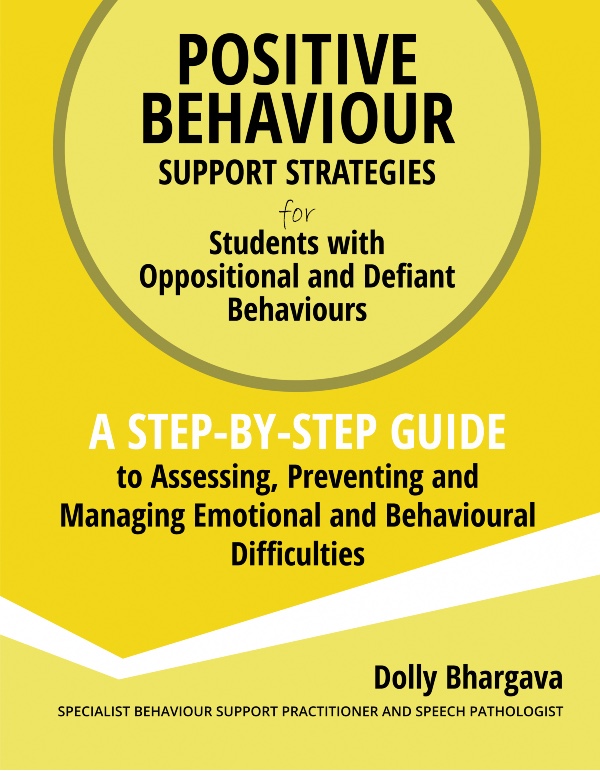PBS for Oppositional and Defiant Behaviours Online Course
Positive Behaviour Support (PBS) strategies for Oppositional and Defiant Behaviours is a comprehensive online course which will provide you with a toolkit of practical, evidence-based strategies to address oppositional and defiant behaviours behaviour in your child, whether or not they have a diagnosis of ODD.
You will be taught a range of behaviour management strategies to respond effectively to behaviours of concern and also to develop a behaviour support plan to support the individual develop positive ways of managing their emotions and behaving.
What is Oppositional and Defiant Disorder?
Oppositional Defiant Disorder (ODD) is defined in the Diagnostic and Statistical Manual of Mental Disorders 5th edition (DSM-V) (APA, 2013) as a pattern of angry/irritable mood, argumentative/defiant behaviours or vindictiveness towards authority figures.
According to the DSM-V, the first symptoms of Oppositional Defiant Disorder appear in early childhood, on rare occasions these emerge after early adolescence.
At what age do the symptoms of ODD typically appear?
ODD can be diagnosed in both childhood and adolescence, with early-onset typically identified before age 8 and adolescent-onset occurring during the teenage years. Accurate diagnosis involves a thorough assessment of symptoms, their duration and frequency, and the impact on the child's functioning. Early identification and intervention are crucial for managing ODD and preventing the escalation of behavioral problems.
Can ODD be treated?
Yes, ODD can be managed and treated with a combination of therapies and strategies tailored to the individual child and their family.
How prevalent is Oppositional Defiant Disorder (ODD)?
The prevalence of ODD varies, but it is estimated to affect about 3-16% of children and adolescents. Boys are more commonly diagnosed with ODD than girls, especially before puberty.
How is ODD different from typical childhood behaviour?
It is common for children, adolescents and young adults to occassionally argue with authority figures, aggravate others, blame others for their own actions, refuse to comply with a request or abide by rules. However, these behaviours are often the result of situational factors or a developmental phase and are short-lived in nature. When these types of behaviours occur more frequently and intensely, and their actions are persistent, lasting for at least six months it is useful to further investigate the reasons.
Can ODD co-occur with other disorders?
Yes, ODD can co-occur with other behavioural disorders such as Attention Deficit Hyperactivity Disorder (ADHD), anxiety disorders, mood disorders, and learning disabilities.
What are the causes of ODD?
Research has not yet determined the cause of Oppositional Defiant Disorder, however, several risk factors are known to contribute towards the development of ODD, including:
-
Genetic factors – Oppositional Defiant Disorder can be inherited in families who have a history of Attention Deficit Hyperactivity Disorder (ADHD), substance use disorders or mood disorders,
-
Physiological factors – abnormal brain chemical activity or neurotransmitter functioning,
-
Temperamental factors – the individual may have a historically difficult temperament,
-
-
Caregiver rejection and neglect
-
Disharmony in the home
-
Caregiver mental health difficulties
-
Caregiver substance abuse
-
Caregiver criminality
-
Institutionalisation
-
Frequent change in caregiver
-
Being part of a large family
Environmental factors – the environment in which the individual resides can be a risk factor in itself, specifically:
-
What are the symptoms of ODD?
Oppositional Defiant Disorder (ODD) is characterized by a pattern of angry, irritable mood, argumentative/defiant behavior, or vindictiveness lasting at least six months. The symptoms are usually evident during interactions with at least one individual who is not a sibling. Here are the key symptoms grouped by category:
Angry/irritable mood
-
Often loses temper: Frequent displays of anger or irritability.
-
Is often touchy or easily annoyed: Overreacts to minor frustrations or inconveniences.
-
Is often angry and resentful: Holds on to grudges and displays persistent anger.
Argumentative/Defiant Behaviour
-
Often argues with authority figures or adults: Consistently disputes rules or requests from parents, teachers, or other adults.
-
Often actively defies or refuses to comply with requests from authority figures or with rules: Deliberately ignores instructions or rules.
-
Often deliberately annoys others: Engages in behaviour meant to bother or upset others.
-
Often blames others for his or her mistakes or misbehaviour: Refuses to take responsibility for their actions and places the blame on others.
Vindictiveness
-
Has been spiteful or vindictive at least twice within the past six months: Shows a desire to get back at others or cause them harm.
Does ODD get better with age?
Oppositional Defiant Disorder (ODD) can improve with age, especially with appropriate intervention and support. The outcomes for children and adolescents with ODD vary and are influenced by several factors, including the severity of the disorder, the presence of co-occurring conditions, the quality of interventions, and the support systems in place.


